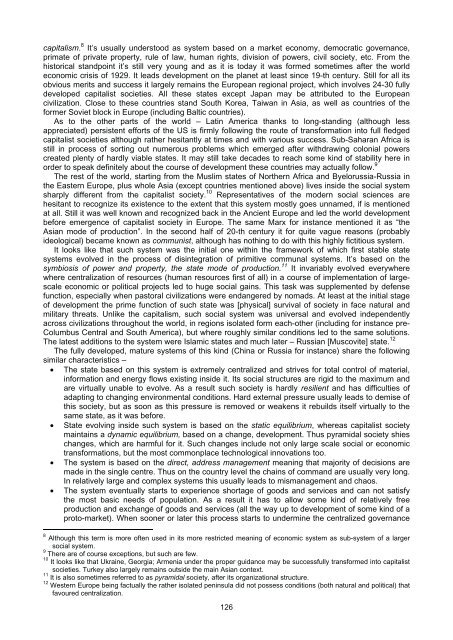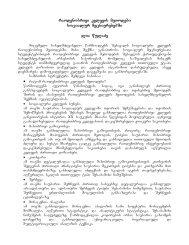capitalism. 8 It’s usually understood as system based on a market economy, democratic governance,primate of private property, rule of law, human rights, division of powers, civil society, etc. From thehistorical standpoint it’s still very young and as it is today it was <strong>for</strong>med sometimes after the worldeconomic crisis of 1929. It leads development on the planet at least since 19-th century. Still <strong>for</strong> all itsobvious merits and success it largely remains the European regional project, which involves 24-30 fullydeveloped capitalist societies. All these states except Japan may be attributed to the Europeancivilization. Close to these countries stand South Korea, Taiwan in Asia, as well as countries of the<strong>for</strong>mer Soviet block in Europe (including Baltic countries).As to the other parts of the world – Latin America thanks to long-standing (although lessappreciated) persistent ef<strong>for</strong>ts of the US is firmly following the route of trans<strong>for</strong>mation into full fledgedcapitalist societies although rather hesitantly at times and with various success. Sub-Saharan Africa isstill in process of sorting out numerous problems which emerged after withdrawing colonial powerscreated plenty of hardly viable states. It may still take decades to reach some kind of stability here inorder to speak definitely about the course of development these countries may actually follow. 9The rest of the world, starting from the Muslim states of Northern Africa and Byelorussia-Russia inthe Eastern Europe, plus whole Asia (except countries mentioned above) lives inside the social systemsharply different from the capitalist society. 10 Representatives of the modern social sciences arehesitant to recognize its existence to the extent that this system mostly goes unnamed, if is mentionedat all. Still it was well known and recognized back in the Ancient Europe and led the world developmentbe<strong>for</strong>e emergence of capitalist society in Europe. The same Marx <strong>for</strong> instance mentioned it as “theAsian mode of production”. In the second half of 20-th century it <strong>for</strong> quite vague reasons (probablyideological) became known as communist, although has nothing to do with this highly fictitious system.It looks like that such system was the initial one within the framework of which first stable statesystems evolved in the process of disintegration of primitive communal systems. It’s based on thesymbiosis of power and property, the state mode of production. 11 It invariably evolved everywherewhere centralization of resources (human resources first of all) in a course of implementation of largescaleeconomic or political projects led to huge social gains. This task was supplemented by defensefunction, especially when pastoral civilizations were endangered by nomads. At least at the initial stageof development the prime function of such state was [physical] survival of society in face natural andmilitary threats. Unlike the capitalism, such social system was universal and evolved independentlyacross civilizations throughout the world, in regions isolated <strong>for</strong>m each-other (including <strong>for</strong> instance pre-Columbus Central and South America), but where roughly similar conditions led to the same solutions.The latest additions to the system were Islamic states and much later – Russian [Muscovite] state. 12The fully developed, mature systems of this kind (China or Russia <strong>for</strong> instance) share the followingsimilar characteristics –• The state based on this system is extremely centralized and strives <strong>for</strong> total control of material,in<strong>for</strong>mation and energy flows existing inside it. Its social structures are rigid to the maximum andare virtually unable to evolve. As a result such society is hardly resilient and has difficulties ofadapting to changing environmental conditions. Hard external pressure usually leads to demise ofthis society, but as soon as this pressure is removed or weakens it rebuilds itself virtually to thesame state, as it was be<strong>for</strong>e.• State evolving inside such system is based on the static equilibrium, whereas capitalist societymaintains a dynamic equilibrium, based on a change, development. Thus pyramidal society shieschanges, which are harmful <strong>for</strong> it. Such changes include not only large scale social or economictrans<strong>for</strong>mations, but the most commonplace technological innovations too.• The system is based on the direct, address management meaning that majority of decisions aremade in the single centre. Thus on the country level the chains of command are usually very long.In relatively large and complex systems this usually leads to mismanagement and chaos.• The system eventually starts to experience shortage of goods and services and can not satisfythe most basic needs of population. As a result it has to allow some kind of relatively freeproduction and exchange of goods and services (all the way up to development of some kind of aproto-market). When sooner or later this process starts to undermine the centralized governance8 Although this term is more often used in its more restricted meaning of economic system as sub-system of a largersocial system.9 There are of course exceptions, but such are few.10 It looks like that Ukraine, Georgia; Armenia under the proper guidance may be successfully trans<strong>for</strong>med into capitalistsocieties. Turkey also largely remains outside the main Asian context.11 It is also sometimes referred to as pyramidal society, after its organizational structure.12 Western Europe being factually the rather isolated peninsula did not possess conditions (both natural and political) thatfavoured centralization.126
system, which leads to restoration of the total control. As a result, through the history such statesare moving like pendulum – between the less restricted and more rigid systems.• Obviously the state craves <strong>for</strong> total control of property in general, means of production andfinancial flows. Market, private property, money circulation and exchange of goods are acceptable<strong>for</strong> it only within the strict limits, which it establishes and under its total control. Again, weakeningof such control leads to development of dynamic processes that in the end lead to destabilizationof such state.• Such system is notorious <strong>for</strong> primacy of interest of the state (which is identified with society) overinterests of individuals. People in such societies do not enjoy status of person, but are ratherregarded as easily substitutable, disposable units of a huge state mechanism. Human rights intheir modern Western meaning have no place in such societies. No constructive relationsbetween the state and the people can exist here on principle. Nothing even remotely reminding apublic policy can evolve here. There is just one source of political will – the government, which isregarded as the only initiator of processes in the country. There is very little back feed frompopulation to the state. Thus population per se is left the only option to request or carry outchanges – through direct pressure on the government institutions (often <strong>for</strong>cible).• Contacts in such society are generally vertical. Rights are usually delegated from top to bottom,while responsibilities are organized in the opposite direction. Law is applied in accordance tothese principles too. More or less fairly law is applied only within the same social stratum. Legalacts are usually applied selectively, based on expediency principle (expediency itself beingdetermined by the government).• The state is usually personified in its leader, who often (at least <strong>for</strong>mally) enjoys unlimited powersand can not be held responsible <strong>for</strong> anything. In such state (which is sometimes dubbed aspaternalistic) relations between the authorities (ruler) and its subjects remind relations betweenthe shepherd and his flock. The real problem is that the vast majority of people here reconcilethemselves to state of affairs, willingly delegate their rights to the state and wait passively how itwill decide their fate. Authorities in general and the ruler in particular are perceived as providers oflivelihoods <strong>for</strong> the subjects. Thus even during the large-scale social shocks, when people are onprinciple able to follow the more acceptable course of development, they fight to bring uponthemselves the better ruler.• Such states, often being dependent on personal properties of a single person are extremelyvulnerable <strong>for</strong> this same reason. Good ruler is able to lead such state to prosperity, whileincompetent one may destroy it. There are no actual control mechanisms of such leaders. Stillmore often than not the real power in such states belongs to appointed bureaucrats, who areresponsible only to such persons who appoint them. Usually government bureaucrats enjoyalmost unlimited powers over population. Their activities can only be limited by their superiors andunwritten corporative laws. In the end all these leads to abuse of power and omnipresentcorruption. This also leads to development of rather peculiar social psychology of type – you arethe chief I am the fool; I am the chief you are the fool. Besides government administrators(especially today) often become the largest owners of hybrid private-state property thus gettinghold of one more powerful lever of control.At least half of world’s population lives today within the system described above. Obviouslycountries belonging to it are not homogeneous, although they share the basic systemic characteristics.Some are follow relatively soft model of the state, others are extremely rigid. Such Asiatic or Pyramidalsystem is diametrically opposed to the modern Western society. This does not mean that they shouldbecome antagonistic, but still they are poorly compatible and competitive. Opposition between themstarts on conceptual level – both are based on sharply different value systems, evaluation criteria, andbehavioural stereotypes. That does not mean that values and criteria of Asiatic system are inferior tothese of the Western society – they are simply different.Still speed of changes in spheres of economics, finances, technology is so high that it underminesthe rigid pyramidal society, based on vertical ties. In the modern world the successful society should beable to modify itself in search of the optimum decision-making models. But this is that less adaptabletraditional societal systems are hardly able to do. Fast changes, instability (even if created by positivedevelopment), innovations (especially social or economic) – i.e. everything that is associated withglobalization are hardly acceptable <strong>for</strong> them. The globalization process proper, led by the Westernpowers undermines and destabilizes them. The state of relations of any such state with the developedworld does not matter today – sooner or later it loses the competition (the USSR being the most typicalexample).Thus based on the most primitive survival principle such countries are either to adopt themselves torequests of the modern development or at least turn to the systemic mimicry in order to escape the127
- Page 1 and 2:
socialur mecnierebaTa seriamsofliop
- Page 3:
s a r C e v iSesavali .............
- Page 6 and 7:
situaciis arseboba, Tavis mxriv, am
- Page 8 and 9:
globalizacia — ori antagonisturi
- Page 10:
(informacia), vidre ramdenime aTeul
- Page 13 and 14:
TanamSromlobas. faqtiurad SesaZlebe
- Page 15 and 16:
1.3. msoflio politikis Teoriebi1.3.
- Page 17 and 18:
TanamSromlobaze uaris Tqma sul ufro
- Page 19 and 20:
danarCeni msofliosagan gansxvavebiT
- Page 21 and 22:
meqanizmebi ubralod ar arsebobs;•
- Page 23 and 24:
idga zemoT daxasiaTebul “piramidu
- Page 25 and 26:
amocanebis gadasaWrelad. 37es ar ni
- Page 27 and 28:
dacema, pirvel rigSi, materialuri d
- Page 29 and 30:
ealurad globaluri iyo. isini, isevd
- Page 31 and 32:
mSeneblobis procesSi klasobrivi brZ
- Page 33 and 34:
dolaris daxmareba miiRo.sainteresoa
- Page 35 and 36:
sistemas da gamoiwvia britaneTis im
- Page 37 and 38:
miekuTvneboda (ix. danarTi 3.1 da 3
- Page 39 and 40:
TiTqmis mTlianad ugulvebelyos is pr
- Page 41 and 42:
2.2.5. meore globalizaciis dros gag
- Page 43 and 44:
gakeTeba (iaponia). meore mxriv, er
- Page 45 and 46:
ac saboloo jamSi qmnis sistemis des
- Page 47 and 48:
laparakia imaze, rom romelime calke
- Page 49 and 50:
mmarTvelobis principebis adaptacia
- Page 51 and 52:
matareblebi arian. ukve es faqti aq
- Page 53 and 54:
warmoadgens nebismieri warmatebuli
- Page 55 and 56:
koloradosa da vaiomingis nawilebi.
- Page 57 and 58:
xSirad faqtiurad kulturuli misioner
- Page 59 and 60:
dasawyisSi oficialurad TviT aSS-ma
- Page 61 and 62:
mosaxleobis 20%, romelic yvelaze md
- Page 63 and 64:
sruli liberalizaciis Sesaxeb faqtiu
- Page 65 and 66:
gansxvavebebi, ganpirobebuli maTi e
- Page 67 and 68:
urTierTobaSi.3.4. zemoT aRwerili pr
- Page 69 and 70:
evri qveynisaTvis zemoT aRwerili ti
- Page 71 and 72:
aSS saerTaSoriso daxmarebis naxevar
- Page 73 and 74:
aSkarad sWarbobs evrogerTianebis ne
- Page 79 and 80: meore — Tanamedrove sabrZolo saSu
- Page 81 and 82: SeuZliaT, an ar awyobT efeqturi Ron
- Page 83 and 84: amoiwura.cnobili ebraeli moRvawe,
- Page 85 and 86: masze agebuli civilizaciis sistemur
- Page 87 and 88: eJimi mravali wlis manZilze xels uw
- Page 89 and 90: mxolod SedarebiT mcire nawils Seexo
- Page 91 and 92: daavadebebiT. am konfliqtSi monawil
- Page 93 and 94: naxevar saukunes moiTvlis. principS
- Page 95 and 96: kontrols eqvemdebareba.rac Seexeba
- Page 97 and 98: • faqtiurad nebismieri gadawyveti
- Page 99 and 100: 4.2.3. globalur doneze aseTi tipis
- Page 101 and 102: krizisebisagan, rom rodesac bazari
- Page 103 and 104: sabWoTa kavSirma gamomdinare nawilo
- Page 105 and 106: usafrTxoebis erT-erTi ZiriTadi elem
- Page 107 and 108: Microsoft-is top-menejerebs). sadac
- Page 109 and 110: veb-gverdebs; xolo Google-m 2006 we
- Page 111 and 112: saxiT, amerikis moqmedeba SedarebiT
- Page 113 and 114: organizaciebis da a.S.amave dros, r
- Page 115 and 116: 2 termini globaluri mainc uamravi s
- Page 117 and 118: 61 ssrk-s SemTxvevaSi etyoba misi g
- Page 119 and 120: 30-jer naklebia, vidre saavtomobilo
- Page 121 and 122: SesaZlebelia faqtiurad nebismieri s
- Page 123 and 124: however powerful, can become transn
- Page 125: 2. Does not matter in what sphere o
- Page 129 and 130: On the other hand, in the late 19 t
- Page 131 and 132: traceable here, technological compo
- Page 133 and 134: extremist than terrorists themselve
- Page 135 and 136: human rights is routine. 24The situ
- Page 137 and 138: Transformation of Islam, as the rel
- Page 139 and 140: countries, where the government and
- Page 141 and 142: Of course if the developed world ma
- Page 143 and 144: (including affiliated agencies and
- Page 145 and 146: including legal acts, represents re
- Page 147 and 148: passed by its more successful prede
- Page 149 and 150: principle should possess some cultu
- Page 151 and 152: coherent and purposeful than before
















